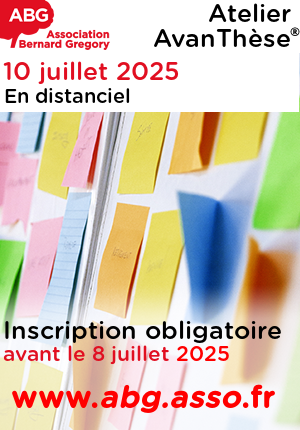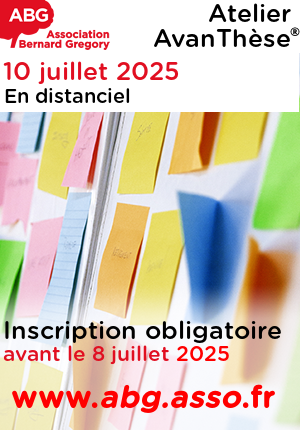Hybridation d'approches d'Intelligence Artificielle et de Recherche Opérationnelle pour l'Allocation Adaptative de Ressources // Hybridization of Artificial Intelligence and Operations Research approaches for Adaptive Resource Allocation
|
ABG-132104
ADUM-66011 |
Thesis topic | |
| 2025-05-21 | Cifre |
IMT MINES ALES
Montpellier - Occitanie - France
Hybridation d'approches d'Intelligence Artificielle et de Recherche Opérationnelle pour l'Allocation Adaptative de Ressources // Hybridization of Artificial Intelligence and Operations Research approaches for Adaptive Resource Allocation
- Computer science
Apprentissage par renforcement, Apprentissage profond, Optimisation combinatoire, Optimisation stochastique , Théorie des files d'attentes
Reinforcement Learning, Deep Learning, Combinatorial optimisation, Stochastic optimisation, Queuing theory
Reinforcement Learning, Deep Learning, Combinatorial optimisation, Stochastic optimisation, Queuing theory
Topic description
Contexte et partenaires
Cette thèse s'inscrit dans une collaboration entre ESII, PME innovante spécialisée dans la gestion des flux physiques et numériques de personnes, et IMT Mines Alès (laboratoire Euromov DHM), établissement reconnu pour son expertise en optimisation combinatoire et en intelligence artificielle.
ESII développe des solutions logicielles et matérielles de gestion d'accueil omnicanal à destination de nombreux secteurs (santé, services publics…). L'entreprise souhaite renforcer les capacités de ses logiciels grâce à l'IA pour améliorer l'allocation automatique en temps réel de ressources humaines et matérielles.
Objectifs de la thèse
L'objectif principal est de proposer des approches d'optimisation hybrides combinant la Recherche Opérationnelle (RO) et l'Intelligence Artificielle (IA), en particulier l'apprentissage par renforcement profond, pour résoudre une problématique d'allocation de ressources dans un environnement :
- Hétérogène : ressources et demandes variées, contraintes individuelles ;
- Multicanal : sollicitations par divers canaux (physique, téléphonique, chat, etc.) ;
- Dynamique et stochastique : demande dynamique, délais incertains.
L'objectif scientifique est de proposer et d'étudier des approches hybrides de planification sous incertitude, et d'apprentissage profond et par renforcement, pour un contrôle robuste et adaptatif du système d'allocation des ressources afin de minimiser les temps d'attente, tout en tenant compte des contraintes métiers et des spécificités des ressources.
Axes de recherche
- Modélisation du problème au travers de Processus de décision Markovien (MDP) et de modélisation standard basée sur la simulation et l'optimisation combinatoire.
- Conception d'algorithmes hybrides RO + IA, s'appuyant sur l'apprentissage profond, l'apprentissage par renforcement et la planification sous incertitude.
- Étude de la robustesse des solutions à différents cas d'usage d'ESII.
- Validation expérimentale sur les données réelles issues de la plateforme d'ESII.
Lieu
La thèse sera réalisée au campus scientifique Louis Leprince-Ringuet, à IMT Mines Alès, Alès France. Les travaux seront plus spécifiquement menés au sein de l'équipe I3A du Centre d'Enseignement et de Recherche en Informatique et Systèmes (CERIS - rattachement au laboratoire EUROMOV DHM), dans un axe dédié à l'étude de techniques d'optimisation combinatoire et d'IA adaptatives et robustes.
------------------------------------------------------------------------------------------------------------------------------------------------------------------------
------------------------------------------------------------------------------------------------------------------------------------------------------------------------
Context and partners
This thesis is part of a collaboration between ESII, an innovative SME specialising in the management of physical and digital flows of people, and IMT Mines Alès (Euromov DHM laboratory), an establishment renowned for its expertise in combinatorial optimisation and artificial intelligence.
ESII develops omnichannel reception management software and hardware solutions for a wide range of sectors (healthcare, public services, etc.). The company wants to enhance the capabilities of its software using AI to improve the automatic real-time allocation of human and material resources.
Objectives of the thesis
The main objective is to propose hybrid optimisation approaches combining Operations Research (OR) and Artificial Intelligence (AI), in particular deep reinforcement learning, to solve a resource allocation problem in a :
- Heterogeneous: varied resources and demands, individual constraints;
- Multi-channel: requests via various channels (physical, telephone, chat, etc.);
- Dynamic and stochastic: dynamic demand, uncertain lead times.
The scientific objective is to propose and study hybrid approaches to planning under uncertainty, and deep and reinforcement learning, for robust and adaptive control of the resource allocation system in order to minimise waiting times, while taking account of business constraints and resource specificities.
Research areas
- Modelling the problem using Markov Decision Processes (MDP) and standard modelling based on simulation and combinatorial optimisation.
- Design of hybrid RO + AI algorithms, based on deep learning, reinforcement learning and planning under uncertainty.
- Study of the robustness of solutions to different IPS use cases.
- Experimental validation on real data from the ESII platform.
Location
The thesis will be carried out at the Louis Leprince-Ringuet scientific campus, at IMT Mines Alès, Alès France. More specifically, the work will be carried out within the I3A team of the Centre d'Enseignement et de Recherche en Informatique et Systèmes (CERIS - part of the EUROMOV DHM laboratory), in an area dedicated to the study of combinatorial optimisation techniques and adaptive and robust AI.
------------------------------------------------------------------------------------------------------------------------------------------------------------------------
------------------------------------------------------------------------------------------------------------------------------------------------------------------------
Début de la thèse : 01/09/2025
Cette thèse s'inscrit dans une collaboration entre ESII, PME innovante spécialisée dans la gestion des flux physiques et numériques de personnes, et IMT Mines Alès (laboratoire Euromov DHM), établissement reconnu pour son expertise en optimisation combinatoire et en intelligence artificielle.
ESII développe des solutions logicielles et matérielles de gestion d'accueil omnicanal à destination de nombreux secteurs (santé, services publics…). L'entreprise souhaite renforcer les capacités de ses logiciels grâce à l'IA pour améliorer l'allocation automatique en temps réel de ressources humaines et matérielles.
Objectifs de la thèse
L'objectif principal est de proposer des approches d'optimisation hybrides combinant la Recherche Opérationnelle (RO) et l'Intelligence Artificielle (IA), en particulier l'apprentissage par renforcement profond, pour résoudre une problématique d'allocation de ressources dans un environnement :
- Hétérogène : ressources et demandes variées, contraintes individuelles ;
- Multicanal : sollicitations par divers canaux (physique, téléphonique, chat, etc.) ;
- Dynamique et stochastique : demande dynamique, délais incertains.
L'objectif scientifique est de proposer et d'étudier des approches hybrides de planification sous incertitude, et d'apprentissage profond et par renforcement, pour un contrôle robuste et adaptatif du système d'allocation des ressources afin de minimiser les temps d'attente, tout en tenant compte des contraintes métiers et des spécificités des ressources.
Axes de recherche
- Modélisation du problème au travers de Processus de décision Markovien (MDP) et de modélisation standard basée sur la simulation et l'optimisation combinatoire.
- Conception d'algorithmes hybrides RO + IA, s'appuyant sur l'apprentissage profond, l'apprentissage par renforcement et la planification sous incertitude.
- Étude de la robustesse des solutions à différents cas d'usage d'ESII.
- Validation expérimentale sur les données réelles issues de la plateforme d'ESII.
Lieu
La thèse sera réalisée au campus scientifique Louis Leprince-Ringuet, à IMT Mines Alès, Alès France. Les travaux seront plus spécifiquement menés au sein de l'équipe I3A du Centre d'Enseignement et de Recherche en Informatique et Systèmes (CERIS - rattachement au laboratoire EUROMOV DHM), dans un axe dédié à l'étude de techniques d'optimisation combinatoire et d'IA adaptatives et robustes.
------------------------------------------------------------------------------------------------------------------------------------------------------------------------
------------------------------------------------------------------------------------------------------------------------------------------------------------------------
Context and partners
This thesis is part of a collaboration between ESII, an innovative SME specialising in the management of physical and digital flows of people, and IMT Mines Alès (Euromov DHM laboratory), an establishment renowned for its expertise in combinatorial optimisation and artificial intelligence.
ESII develops omnichannel reception management software and hardware solutions for a wide range of sectors (healthcare, public services, etc.). The company wants to enhance the capabilities of its software using AI to improve the automatic real-time allocation of human and material resources.
Objectives of the thesis
The main objective is to propose hybrid optimisation approaches combining Operations Research (OR) and Artificial Intelligence (AI), in particular deep reinforcement learning, to solve a resource allocation problem in a :
- Heterogeneous: varied resources and demands, individual constraints;
- Multi-channel: requests via various channels (physical, telephone, chat, etc.);
- Dynamic and stochastic: dynamic demand, uncertain lead times.
The scientific objective is to propose and study hybrid approaches to planning under uncertainty, and deep and reinforcement learning, for robust and adaptive control of the resource allocation system in order to minimise waiting times, while taking account of business constraints and resource specificities.
Research areas
- Modelling the problem using Markov Decision Processes (MDP) and standard modelling based on simulation and combinatorial optimisation.
- Design of hybrid RO + AI algorithms, based on deep learning, reinforcement learning and planning under uncertainty.
- Study of the robustness of solutions to different IPS use cases.
- Experimental validation on real data from the ESII platform.
Location
The thesis will be carried out at the Louis Leprince-Ringuet scientific campus, at IMT Mines Alès, Alès France. More specifically, the work will be carried out within the I3A team of the Centre d'Enseignement et de Recherche en Informatique et Systèmes (CERIS - part of the EUROMOV DHM laboratory), in an area dedicated to the study of combinatorial optimisation techniques and adaptive and robust AI.
------------------------------------------------------------------------------------------------------------------------------------------------------------------------
------------------------------------------------------------------------------------------------------------------------------------------------------------------------
Début de la thèse : 01/09/2025
Funding category
Cifre
Funding further details
CIFRE ANRT
Presentation of host institution and host laboratory
IMT MINES ALES
Institution awarding doctoral degree
IMT MINES ALES
Graduate school
166 I2S - Information, Structures, Systèmes
Candidate's profile
Profil recherché
Formation Bac+5 (Master 2 ou école d'ingénieur), avec spécialisation en recherche opérationnelle, intelligence artificielle ou informatique décisionnelle.
Compétences en optimisation combinatoire, apprentissage profond, apprentissage par renforcement. Les profils couvrant une unique composante (RO ou IA) sont éligibles.
Autonome en programmation et maîtrise du langage Python, et des librairies standard du domaine, en particulier PyTorch ; et éventuellement des langages C/C++.
Curiosité scientifique, autonomie, esprit d'initiative et goût pour le travail collaboratif (académique et industriel).
5 years' higher education (Masters 2 or engineering school), specialising in operations research, artificial intelligence or business intelligence. Skills in combinatorial optimisation, deep learning, reinforcement learning. Profiles covering a single component (OR or AI) are eligible. Autonomous programming skills and proficiency in the Python language, and standard libraries in the field, in particular PyTorch; and possibly C/C++ languages. Scientific curiosity, autonomy, initiative and a taste for collaborative work (academic and industrial).
5 years' higher education (Masters 2 or engineering school), specialising in operations research, artificial intelligence or business intelligence. Skills in combinatorial optimisation, deep learning, reinforcement learning. Profiles covering a single component (OR or AI) are eligible. Autonomous programming skills and proficiency in the Python language, and standard libraries in the field, in particular PyTorch; and possibly C/C++ languages. Scientific curiosity, autonomy, initiative and a taste for collaborative work (academic and industrial).
2025-06-22
Apply
Close
Vous avez déjà un compte ?
Nouvel utilisateur ?
More information about ABG?
Get ABG’s monthly newsletters including news, job offers, grants & fellowships and a selection of relevant events…
Discover our members
 MabDesign
MabDesign  TotalEnergies
TotalEnergies  Laboratoire National de Métrologie et d'Essais - LNE
Laboratoire National de Métrologie et d'Essais - LNE  ANRT
ANRT  CESI
CESI  ADEME
ADEME  Institut Sup'biotech de Paris
Institut Sup'biotech de Paris  Généthon
Généthon  Tecknowmetrix
Tecknowmetrix  ONERA - The French Aerospace Lab
ONERA - The French Aerospace Lab  SUEZ
SUEZ  CASDEN
CASDEN  Groupe AFNOR - Association française de normalisation
Groupe AFNOR - Association française de normalisation  Aérocentre, Pôle d'excellence régional
Aérocentre, Pôle d'excellence régional  ASNR - Autorité de sûreté nucléaire et de radioprotection - Siège
ASNR - Autorité de sûreté nucléaire et de radioprotection - Siège  MabDesign
MabDesign  PhDOOC
PhDOOC  Nokia Bell Labs France
Nokia Bell Labs France  Ifremer
Ifremer







